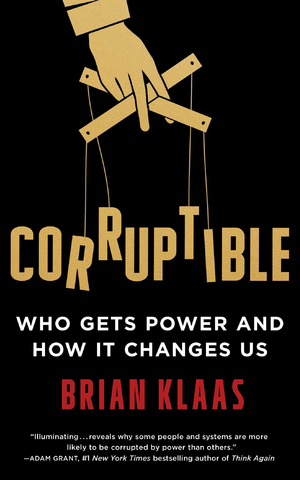
Corruptible: Who Gets Power and How It Changes Us
- Book
- Nov 9, 2021
- #Politics #Politicalphilosophy
A look at what power is, who gets it, and what happens when they do, based on over 500 interviews with those who (temporarily, at least) have had the upper hand—from the creator of...
Show More
Number of Pages: 320
ISBN: 1982154098
ISBN-13: 9781982154097
Mentions
See All
Turgut Guliyev @Turgut_Guliyev
·
Jul 2, 2022
- Answered to The best book you’ve read in 2022?
- From Twitter
Jason Scott Montoya @JasonSMontoya
·
Dec 7, 2023
- Post
“But unlike Scrooge, Raucci had no moral awakening. Instead, his behavior got progressively worse. He sexually harassed subordinates. Anyone who challenged him faced threats. When his secretary casually remarked during watercooler banter that Raucci wasn't "her type," he transferred her to a worse office…
…Raucci warned that nobody should cross him, lest he have to "eliminate" them. "Only I will be the fixer…
The person wrote an anonymous letter, detailing Raucci's abuses as president of the maintenance unit. He wasn't fit for union leadership, the letter claimed.
Raucci went ballistic. Someone had double-crossed him.” - Brian Klaas
Jason Scott Montoya @JasonSMontoya
·
Dec 31, 2023
- Post
“Learning is an integral part of getting power and holding on to it. That creates a misperception. I you analyzed the data, it would appear as if someone were getting worse over time— that power was corrupting them. In fact, their bad intent may have been static while their effectiveness increased. They were always corrupt. They just got better at it.”
Jason Scott Montoya @JasonSMontoya
·
Dec 31, 2023
- Post
“All of this serves a crucial purpose that dictators learn over time: it's a loyalty test that sorts people you can trust from people you can't. If people are willing to publicly embarrass themselves by spouting obviously absurd lies about the "Dear Leader" then they're more likely to be worthy of the regime's trust.
A henchman who parrots absurdities is a henchman worth investing in. The problem, though, is that eventually those myths surrounding the leader become commonplace in society, so nobody is going out on a limb to repeat them.
The solution? Invent crazier myths, constantly testing people… to see who goes along with it and who doesn't. That strategy creates a ratcheting effect: if the lies don't get more extreme, your loyalty tests become useless. It appears that dictators' thirst for absolute control is warping their minds, when it's often just a sharpening of their strategies. Power didn't corrupt them. They learned to be good at being bad.”